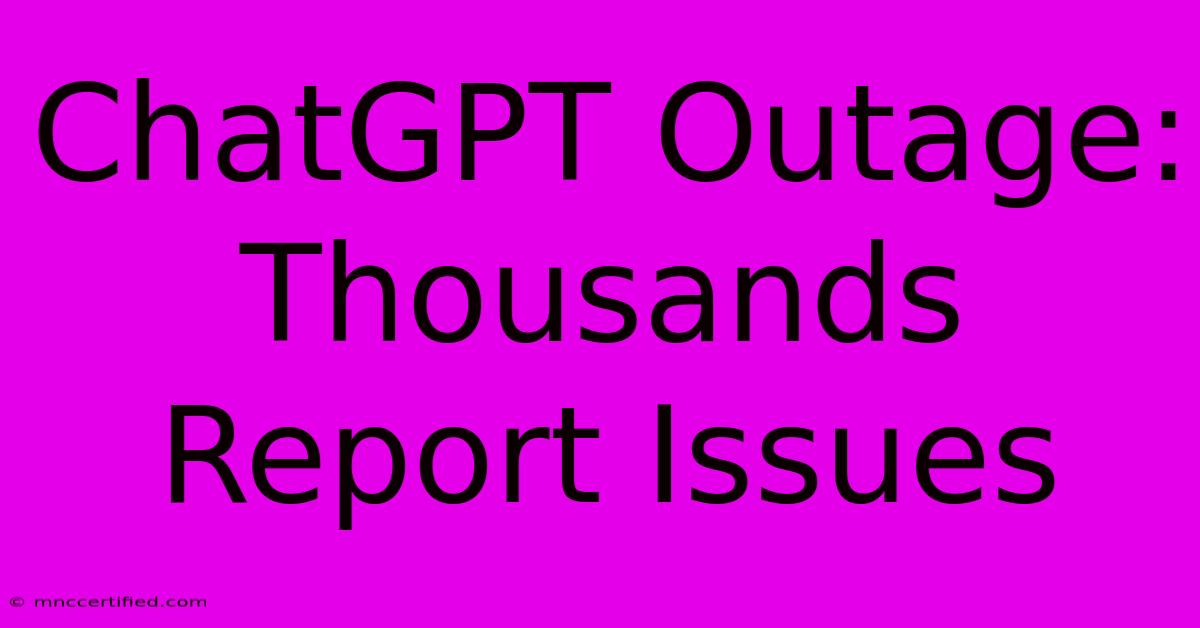ChatGPT Outage: Thousands Report Issues

Table of Contents
ChatGPT Outage: Thousands Report Issues – What Happened and What to Expect
On [Date of Outage], thousands of users reported widespread issues accessing ChatGPT, OpenAI's popular AI chatbot. This significant outage sparked widespread concern and frustration among users reliant on the platform for various tasks, from creative writing to coding assistance. This article delves into the details of the outage, explores potential causes, and offers insights into what users can expect going forward.
The Extent of the ChatGPT Outage
Reports flooded social media platforms like Twitter and Reddit, with users complaining of inability to access ChatGPT. The outage wasn't limited to a specific region; users worldwide reported experiencing difficulties. DownDetector, a website that tracks website outages, showed a massive spike in reported problems, confirming the widespread nature of the disruption. Many users received error messages, while others experienced slow loading times or complete unavailability of the service. The outage impacted both the free and paid versions of ChatGPT, highlighting the severity of the issue.
Impact on Users
The ChatGPT outage had a significant impact on numerous users, disrupting workflows and productivity for many. Students relying on ChatGPT for research and writing assignments faced setbacks. Professionals who use the platform for tasks like content creation, code generation, and customer service experienced disruptions in their daily routines. The widespread nature of the outage underscores the increasing reliance on AI tools like ChatGPT in various aspects of modern life. This dependency highlights the need for robust infrastructure and contingency plans to prevent future disruptions.
Potential Causes of the ChatGPT Outage
While OpenAI has not yet released an official statement detailing the precise cause of the outage, several potential factors could have contributed to the widespread disruption:
- Server Overload: A sudden surge in user traffic could have overwhelmed OpenAI's servers, leading to service disruptions. Increased popularity and demand for ChatGPT might have exceeded the capacity of the existing infrastructure.
- Technical Glitches: Unexpected software bugs or hardware malfunctions within OpenAI's systems could have triggered the outage. These glitches can range from minor coding errors to more significant issues impacting core functionalities.
- Maintenance and Updates: Planned or unplanned maintenance activities on OpenAI's servers could have temporarily interrupted access to ChatGPT. While routine maintenance is crucial, it can sometimes lead to unforeseen disruptions.
- Cyberattacks: Although less likely, the possibility of a cyberattack targeting OpenAI's infrastructure cannot be entirely ruled out. Such attacks could aim to disrupt services or steal data.
What to Expect After a ChatGPT Outage
Following a significant outage like this, users can expect several things:
- Official Communication: OpenAI will likely release an official statement explaining the cause of the outage and the steps taken to restore service. This communication will likely include an apology for the inconvenience caused to users.
- Service Restoration: OpenAI engineers will work to resolve the underlying issues and restore full functionality to ChatGPT. The timeframe for restoration can vary depending on the complexity of the problem.
- Improved Infrastructure: In the aftermath of the outage, OpenAI might invest in upgrading their infrastructure to prevent similar disruptions in the future. This could include scaling up server capacity and implementing improved redundancy measures.
- Increased Transparency: The outage might prompt OpenAI to increase transparency regarding their service status and provide users with more timely updates during future disruptions.
Learning from the Outage: Resilience and Backup Plans
The ChatGPT outage serves as a reminder of the importance of having backup plans when relying on online services. For professionals and students using ChatGPT for critical tasks, considering alternative tools or methods can help mitigate the impact of future disruptions. Diversifying your resources and not placing all your eggs in one basket is a crucial lesson learned from this significant event.
This outage emphasizes the increasing reliance on AI-driven tools and the need for robust infrastructure to support this growing demand. OpenAI's response and subsequent actions will be critical in maintaining user trust and confidence in their services. We will continue to monitor the situation and update this article with any further developments.

Thank you for visiting our website wich cover about ChatGPT Outage: Thousands Report Issues. We hope the information provided has been useful to you. Feel free to contact us if you have any questions or need further assistance. See you next time and dont miss to bookmark.
Featured Posts
-
Best After Christmas Sales Deals
Dec 27, 2024
-
Wolves Vs Man United Tv Listings And Streaming
Dec 27, 2024
-
Bridgewaters Coaching Debut State Championship Win
Dec 27, 2024
-
Newcastle Vs Aston Villa Lineup And Team News
Dec 27, 2024
-
Channel 5s Unexpectedly Funny Killer Wife
Dec 27, 2024